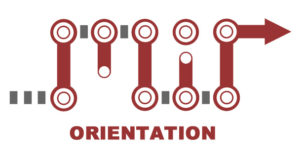By Rose O. Sherman, EdD, RN, NEA-BC, FAAN
 I attended a conference this last week and an interesting question was posed by Jessica Thomas, an ED director. In an environment where many nurses are switching jobs frequently, how do you manage nurses who are serial-orientees. These are nurses who take full-time positions (not travel contracts) and spend a good portion of their first and in many cases only year with an employer in orientation.
I attended a conference this last week and an interesting question was posed by Jessica Thomas, an ED director. In an environment where many nurses are switching jobs frequently, how do you manage nurses who are serial-orientees. These are nurses who take full-time positions (not travel contracts) and spend a good portion of their first and in many cases only year with an employer in orientation.
Historically, turnover in most systems has been relatively low but patterns of employment are changing. Stellar organizations with a highly engaged and satisfied nursing workforce are seeing their turnover increase especially among Millennial staff. This is especially true in areas with a wide-range of employment opportunities. Most nursing leaders that I have spoken with believe that this trend is a new norm and perhaps a new social contract. To be effective in this environment, managers need to change the way they think about loyalty and on-boarding.
This situation also leads to interesting questions about our traditional orientation practices. Orientation costs in facilities can be quite high and require a significant investment of both resources and staff preceptor time. Even very experienced clinical nurses need time to be oriented to organizational procedures, policies and equipment. It is not surprising that we are seeing a trend that the hiring and orientation of new nurses is often contracted out to workforce management business solution companies who streamline orientation by making it more competency-based. Beyond the issue of orientation, managing nurses who have shorter tenures of employment presents unique challenges for managers especially in the area of performance management. Nurse managers in these situations need to be vigilant to insure that there are no major competency or behavioral/addiction problems that could have led to short job tenures.
Some best management practices from the experts include the following:
- Don’t focus on the “job hopping” pattern of employment once you have made an employment commitment.
- Engage with new nurses from the first day of their employment with frequent check-backs.
- Adopt a coaching style of leadership to help the staff member envision a future on the unit.
- Create an environment where the nurse can continue learn and advance their skill set.
- Work with your nurse preceptors to avoid the burnout that they might experience in a higher turnover environment.
- Build a sense of connectedness and community in the workplace that engages new staff from the first day of employment.
- Tap into ideas and innovation that they might have observed in other facilities and let them know you value what they may have learned from these experiences.
While shorter tenures may be a new norm, there is also a trend for nurses to return to previous employers after learning that the grass may not be greener in another organization. When great nurses leave, wise managers keep the lines of communication open and stay connected.
References
The Talent Economy Website (May 8th, 2017). The new employer-employee social contract.
© emergingrnleader.com 2018


 LinkedIn
LinkedIn Instagram
Instagram